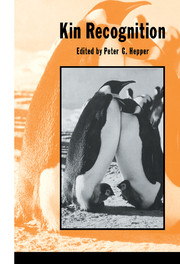Book contents
- Frontmatter
- Contents
- List of contributors
- Preface
- Introduction
- 1 The correlation between kinship and behaviour in non-human primates
- 2 Co-operation and reciprocity in birds and mammals
- 3 Kinship and fellowship in ants and social wasps
- 4 Successes and failures of parent–offspring recognition in animals
- 5 Kinship, kin discrimination and mate choice
- 6 Genetic components of kin recognition in mammals
- 7 Kin recognition in amphibians
- 8 Kin recognition cues of vertebrates
- 9 Recognizing kin: ontogeny and classification
- 10 Parental states as mechanisms for kinship recognition and deception about relatedness
- 11 Fetal learning: implications for the development of kin recognition
- 12 Information processing and storage during filial imprinting
- 13 The honey bee as a model kin recognition system
- 14 Mutual mother–infant recognition in humans
- Author index
- Species and common name index
- Subject index
10 - Parental states as mechanisms for kinship recognition and deception about relatedness
Published online by Cambridge University Press: 06 January 2010
- Frontmatter
- Contents
- List of contributors
- Preface
- Introduction
- 1 The correlation between kinship and behaviour in non-human primates
- 2 Co-operation and reciprocity in birds and mammals
- 3 Kinship and fellowship in ants and social wasps
- 4 Successes and failures of parent–offspring recognition in animals
- 5 Kinship, kin discrimination and mate choice
- 6 Genetic components of kin recognition in mammals
- 7 Kin recognition in amphibians
- 8 Kin recognition cues of vertebrates
- 9 Recognizing kin: ontogeny and classification
- 10 Parental states as mechanisms for kinship recognition and deception about relatedness
- 11 Fetal learning: implications for the development of kin recognition
- 12 Information processing and storage during filial imprinting
- 13 The honey bee as a model kin recognition system
- 14 Mutual mother–infant recognition in humans
- Author index
- Species and common name index
- Subject index
Summary
Parental care is one form of parental investment and investing in one young detracts from the ability of a parent to invest in others (Trivers, 1974). Parents are thus expected to allocate investment to one young until the cost of giving that care exceeds the benefit in terms of survival of the infant or, more correctly, in terms of survival of the half set of genes a diploid organism passes on to its sexually produced offspring. Each parent should attempt to maximize its production of viable offspring, that is by judicious allocation of resources it should attempt to maximize its genetic contribution to the next generation. Investment in unrelated young, however, will detract from the ability of an animal to produce its own offspring and hence will lead to a reduction in fitness. Mechanisms are, therefore, expected to evolve to ensure that investment is not wasted. It is the purpose of this chapter to examine some of these mechanisms by which parents reduce the possibility of investing in non-kin.
A parent could also suffer a loss of fitness if it were to harm its own offspring. This is a possibility because males and females of many species commonly utilize conspecific infants as food. For example, this occurs in fish (reviewed by Dominey & Blumer, 1984), gulls (reviewed by Mock, 1984), and rodents (Elwood, 1977; Sherman, 1981). It is important that parents should avoid cannibalizing their own offspring except in extreme circumstances (Labov et al, 1985).
- Type
- Chapter
- Information
- Kin Recognition , pp. 289 - 307Publisher: Cambridge University PressPrint publication year: 1991
- 2
- Cited by



